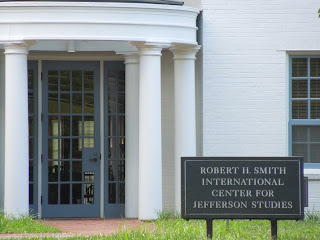 I spent two days at the Thomas Jefferson library near
Monticello cruising through the bound transcripts of his Papers, and browsing
the stacks. Although primary sources are
the gold standard, I find equally precious gems in secondary sources. Gasp! Did
I really say that? Yes, I did, and here’s why.
I spent two days at the Thomas Jefferson library near
Monticello cruising through the bound transcripts of his Papers, and browsing
the stacks. Although primary sources are
the gold standard, I find equally precious gems in secondary sources. Gasp! Did
I really say that? Yes, I did, and here’s why.
Unless you are a veteran scholar of TJ and
have spent your career steeped in his work, then you need some guidance to the
immense amount of writing the man left behind. Jefferson wrote some 18,000
letters (compared to his contemporaries who wrote about 5000), and then there
are the letters he received, political missives, declarations, summaries,
essays, financial memorandum, travel journals, daily notations in a farm book,
garden book, and meteorological data
covering more than 60 years. That’s a lot of stuff to plow through. Thankfully scholars have done much of the
shoveling for you. Some clear a better path than others, and that’s where a
great librarian is invaluable showing you who to trust and what to steer clear
of. Anna Berkes at the TJ library is one
of those librarians.
 Besides
the sheer volume of Jefferson’s legacy, you also need help understanding what
he and others of his time meant. The
overly polite courtesies of 18th century letter writing can be
tedious to slog through. Several times I found myself thinking, “Get on with
it, already.” On the other hand they
were conscientious enough to future readers to note which letters they were
referring to. They had to – after all, letters took days and weeks to reach their destination.
Besides
the sheer volume of Jefferson’s legacy, you also need help understanding what
he and others of his time meant. The
overly polite courtesies of 18th century letter writing can be
tedious to slog through. Several times I found myself thinking, “Get on with
it, already.” On the other hand they
were conscientious enough to future readers to note which letters they were
referring to. They had to – after all, letters took days and weeks to reach their destination.
It's harder to 'get' 18 th
century sarcasm. When were they being
snarky? When were they joking? Thomas
and one of his college buddies often wrote letters of their great adventures
trying to top the other one. So, some of the adventures TJ wrote about never
happened. How would I know that if Kevin
Hayes, author of Road to Monticello, hadn’t told me?
So,
thank you Anna and Jack at the Thomas Jefferson Library for locating documents
for me, and thank you to Betts, Boyd, Padover, Hatch, Peterson, Meacham, Hayes, Thomson, Wulf, Dugatkin, and
all the writers who have come before me who are helping me understand one of the most amazing men in history.